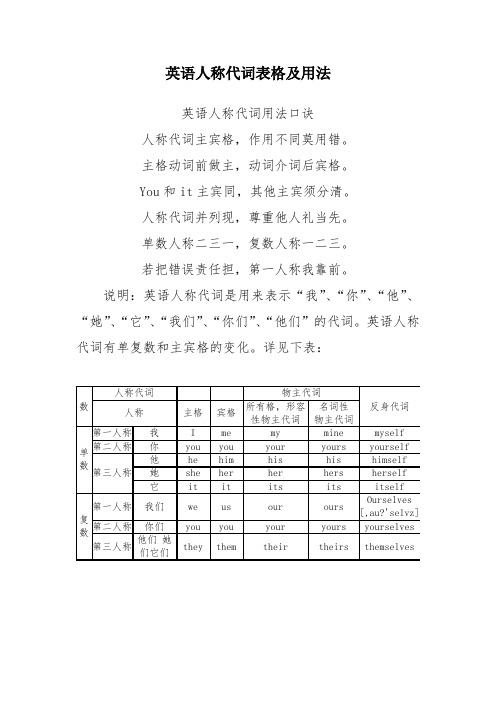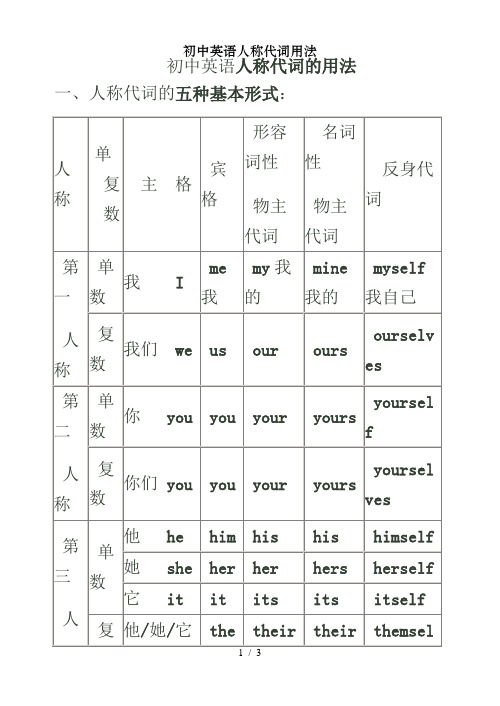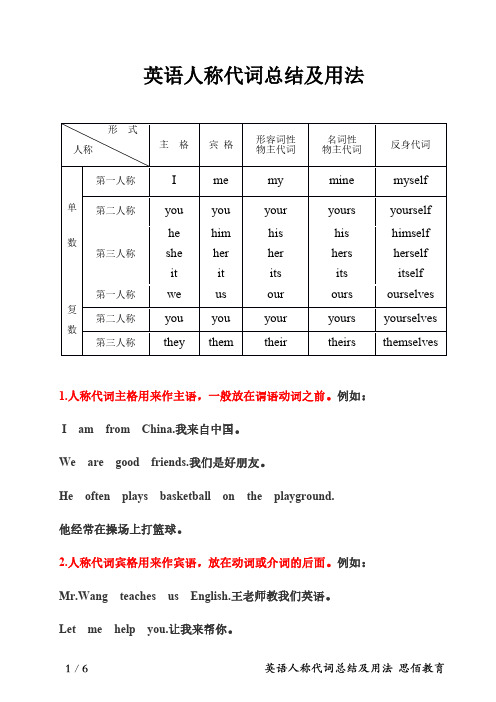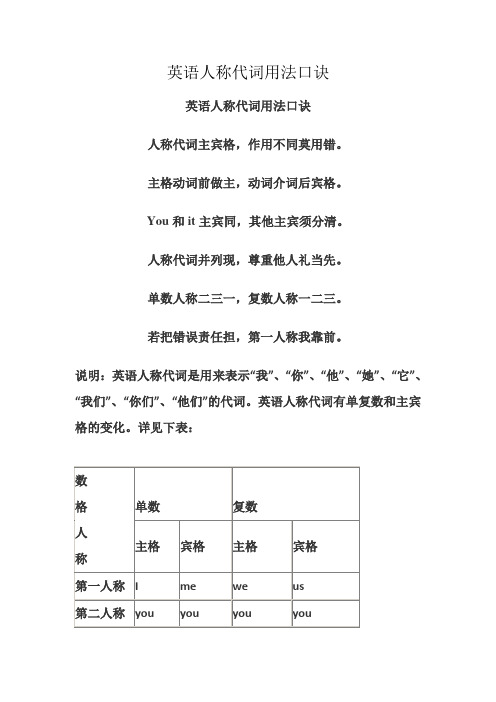英语人称代词的用法
英语人称各种形式的用法

英语人称各种形式的用法
英语中的人称代词有多种形式,包括主格、宾格和所有格。
以下是各种人称代词的用法:
1. 主格人称代词:在句子中作为主语使用,例如“I am a student”中的“I”和“You are late”中的“You”。
2. 宾格人称代词:在句子中作为动词或介词的宾语使用,例如“He saw me”中的“me”和“Give it to her”中的“her”。
3. 所有格人称代词:表示所有关系,例如“My book is on the table”中的“My”和“His bike is blue”中的“His”。
第一人称单数:我,用法为I(我),例如:I am a student.
第一人称复数:我们,用法为We(我们),例如:We are friends.
第二人称单数和复数:你,你们,用法为You(你,你们),例如:You are late.
第三人称单数:他、她、它,用法为He(他)、She(她)、It(它),例如:He is a teacher.。
英语人称代词用法口诀

英语人称代词用法口诀英语人称代词用法口诀人称代词主宾格,作用不同莫用错。
主格动词前做主,动词介词后宾格。
You和it主宾同,其他主宾须分清。
人称代词并列现,尊重他人礼当先。
单数人称二三一,复数人称一二三。
若把错误责任担,第一人称我靠前。
说明:英语人称代词是用来表示“我”、“你”、“他”、“她”、“它”、“我们”、“你们”、“他们”的代词。
英语人称代词有单复数和主宾格的变化。
详见下表:用法:1.人称代词主格用来作主语,一般放在谓语动词之前。
例如:I am from China.我来自中国。
We are good friends.我们是好朋友。
He often plays basketball on the playground.他经常在操场上打篮球。
2.人称代词宾格用来作宾语,放在动词或介词的后面。
例如:Mr.Wang teaches us English.王老师教我们英语。
Let me help you.让我来帮你。
What’s wrong with him ?他怎么了?3.两个或两个以上的人称代词并列作主语时,排列顺序为:单数人称二、三、一,复数人称一、二、三。
例如:You ,she and I are good friends.我,你和她都是好朋友。
We,you and they all like music.我们,你们和他们都喜欢音乐。
4.当I与其他词语一起并列作主语时,I要放在后面,但承认错误时,I要放在前面。
例如:She and I are in the same school.她和我在同一个学校。
I and he make mistakes.我和他犯了错误。
英语代词的用法总结

英语代词的用法总结代词在英语中扮演着非常重要的角色,它们用于代替名词,从而避免过度重复,并且使句子更加流畅和简洁。
本文将对英语代词的用法进行详细的总结。
一、人称代词:人称代词用于代替特定的人或物。
在英语中,人称代词有三个人称:第一人称(I、we)、第二人称(you)和第三人称(he、she、it、they)。
1. 第一人称代词(I、we)用于表达说话者自己。
例如:I am a student.(我是一个学生。
)We are going to the movies.(我们要去看电影。
)2. 第二人称代词(you)用于称呼对方或者对多个人说话。
例如:You are my best friend.(你是我最好的朋友。
)Are you ready?(你准备好了吗?)3. 第三人称代词(he、she、it、they)用于代替他人或物。
例如:He is my brother.(他是我的弟弟。
)She loves to sing.(她喜欢唱歌。
)It is a beautiful day.(今天天气很好。
)They are coming to visit tomorrow.(他们明天要来访问。
)二、指示代词:指示代词用于指示远离或靠近说话者的人或物。
英语中的指示代词包括:this、that、these、those。
1. this:用于指代靠近说话者的人或物。
例如:This is my car.(这是我的车。
)2. that:用于指代远离说话者的人或物。
例如:That is your book.(那是你的书。
)3. these:用于指代靠近说话者的复数人或物。
例如:These are my friends.(这些是我的朋友。
)4. those:用于指代远离说话者的复数人或物。
例如:Those are their houses.(那些是他们的房子。
)三、反身代词:反身代词用于表示动作反映回自身的动作。
在英语中,反身代词以“-self”或“-selves”结尾,如myself、yourself、himself、herself、itself、ourselves、yourselves、themselves。
英语人称代词表格和用法

英语人称代词表格及用法英语人称代词用法口诀人称代词主宾格,作用不同莫用错。
主格动词前做主,动词介词后宾格。
You和it主宾同,其他主宾须分清。
人称代词并列现,尊重他人礼当先。
单数人称二三一,复数人称一二三。
若把错误责任担,第一人称我靠前。
说明:英语人称代词是用来表示“我”、“你”、“他”、“她”、“它”、“我们”、“你们”、“他们”的代词。
英语人称代词有单复数和主宾格的变化。
详见下表:用法:1、人称代词主格用来作主语,一般放在谓语动词之前。
例如:I am from China.我来自中国。
We are good friends.我们是好朋友。
He often plays basketball on the playground.他经常在操场上打篮球。
2、人称代词宾格用来作宾语,放在动词或介词的后面。
例如:Mr.Wang teaches us English.王老师教我们英语。
Let me help you.让我来帮你。
What’s wrong with him ?他怎么了?3、两个或两个以上的人称代词并列作主语时,排列顺序为:单数人称二、三、一,复数人称一、二、三。
例如:You ,she and I are good friends.我,你和她都是好朋友。
We,you and they all like music.我们,你们和他们都喜欢音乐。
4、当I与其他词语一起并列作主语时,I要放在后面,但承认错误时,I要放在前面。
例如:She and I are in the same school.她和我在同一个学校。
I and he make mistakes.我和他犯了错误。
形容词性物主代词与名词性物主代词的区别一、形容词性物主代词起形容词的作用,用在名词前。
例:1、This is my book.这是我的书。
2、We love our motherland['m???l?nd] (祖国).我们热爱我们的祖国。
英语人称的用法

(一)I:我me:我(宾格)my:我的we:我们us:我们(宾格)our:我们的you:你,你们your:你的,你们的he:他him:他(宾格)his:他的she:她her:她(宾格)it:它they:他们them:他们(宾格)(二)me 为宾格my 为属格I 为主语,第一人称me在动词后my在名词前为我的I 做主语,为我me是宾格,用在宾语位置,表示“我”。
例子:He said to me.他告诉我。
my是形容词性物主代词,后面加名词,表示“我的”。
It is my pen.它是我的笔。
I 表示“我”,做主语。
例子:I'm tall. 我很高。
(三)me是“我”的意思,在句中作宾语,是宾格,如:“You can give me same sug gest。
” my意思是“我的”,是名词的所有格,在句中作定语,一般用于句首,如:“My name is Nancy。
” i是“我”,一般作主语,一般放于句首,是主格,如:“I am a go od student。
”(四)your 形容词性物主代词,用在句子中后面一定要接名词 you 主格或宾格如 Thi s is your book. You are a student .(主格) We will help you .( 宾格)(五)具体说she,he就是汉语里面她,他的意思,分别是表示女性和男性的第三人称。
比如我们说:她/他是一个学生,相应英语就是She/He is a student. his,her分别对应he和she的”所有格“,即表示所属关系,相当于汉语中的”他的“和”她的“,例如说汉语说,他/她的书,相应英语就为His/her book。
另外her同样表示she的宾格,当she作为宾语的时候要用her,如,他爱她,需写为He loves her。
her此时相当于him(he 的宾格),若是她爱他,则是She loves him。
英语人称代词

代词(一)代词(pronoun)是指代或替代名词或名词词组的词类,包括人称代词、物主代词、反身代词、相互代词、指示代词、疑问代词、关系代词和不定代词。
一、人称代词1.人称代词作主语通常要与随后的动词保持人称的一致。
例如:I am a teacher.You are a student.He is a doctor.She is a nurse.It is a computer.2.数的一致人称代词应与它的先行项在单、复数形式上保持一致。
例如:Jenny is a nurse. She works at our school clinic.Here are a few TV sets for sale. They are all make in Japan.You, Mike and Andy have finished your work. You can go.3.性的一致单数第三人称代词有阳性、阴性和中性之分,它们的使用决定于所指对象的自然性别。
John didn’t find us, so he left.Jane hasn’t been back, so we are waiting for her.That vase is valuable. It is more than 300 years old.如果是类指,则代词和物主限定词可用he/his:A teacher should offer his students challenging projects.5.格的选择人称代词作主语用主格,作宾语用宾格,表示“所有”用属格。
I teach him Chinese.He teaches me English.This is my bag, that one is yours.人称代词在介词之后常用宾格:I brought some story books for them.They are talking about me.Most of us like learning English.人称代词在动词be之后常用宾格:Who is it?-It’s me.If I were him, I would not do that thing.★It 可以有许多用法,表示:a. 某样东西:Where’s my map? I left it on the table.b. 抽象事物:You saved my life. I shall never forget it.c. 不知性别的孩子:What a beautiful baby!—Is it a boy?d. 某种感觉或情况:Where does it hurt? How is it going with you?e. 是谁:Who is it(that)?—It’t me.f. 时间、日期等:What time is it ? –It’s eight o’clock.g. 天气、环境:It’s raining.h. 距离等:How far is it to New York? --It is 800 kilometers.二、物主代词形容词性物主代词(my/your/his/her/its/our/their)+名词而名词性物主代词(mine/yours/his/hers/its/ours/theirs则相单于形容词性物主代词+名词,故其后不必加名词。
初中英语人称代词用法

初中英语人称代词用法
初中英语人称代词的用法
一、人称代词的五种基本形式:
二、人称代词的基本用法:
1.主格:用作句子的主语,放在动词前(疑问句式放
在特殊动词后)
e.g She lives in Canada.
2.宾格:用作句子的宾语,放在动词或介词后
e.g Yesterday my mother bought me a new bike.
3.形容词性物主代词:用作句子的定语,之后必须带
名词
e.g This is my book. That’s his book.
4.名词性物主代词:=形容词性物主代词+名词:相当
于一个名词词组,之后不能带名词
e.g His book is much newer than mine(= my book).
5.反身代词:一般放在动词后,要求同主语人称一致
enjoy oneself 玩得开心help oneself to 随便吃dress oneself 自己穿衣服by oneself 独自teach oneself 自学look arter oneself 照顾自己hurt oneself 受伤。
初中英语人称代词的用法总结

初中英语人称代词的用法总结人称代词是指直接指代人或者事物的代词,在英语中经常会用到这一个知识点。
小编为大家准备了一些相关的资料,一起来看看吧!人称代词的用法1)人称代词的主格在句子中作主语或主语补语,例如:John waited a while but eventually he went home.约翰等了一会儿,最后他回家了。
John hoped the passenger would be Mary and indeed it was she.约翰希望那位乘客是玛丽,还真是她。
说明:在复合句中,如果主句和从句主语相同,代词主语要用在从句中,名词主语用在主句中,例如:When he arrived, John went straight to the bank.约翰一到就直接去银行了。
2)人称代词的宾格在句子中作宾语或介词宾语,但在口语中也能作主语补语,第一人称在省略句中,还可以作主语,例如:I saw her with them, at least, I thought it was her.我看到她和他们在一起,至少我认为是她。
(her做宾语,them 做介词宾语,her做主语补语)a. -- Who broke the vase? --谁打碎了花瓶?b. -- Me. --我。
(me做主语补语= It's me.)说明:在上面两例句中,her和me分别作主语补语。
现代英语中多用宾格,在正式文体中这里应为she和I。
代词的指代问题1)不定代词anybody,everybody,nobody,anyone,someone,everyone,no one,及whoever和person在正式场合使用时,可用he, his, him代替。
Nobody came, did he? 谁也没来,是吗?2)动物名词的指代一般用it或they代替,有时也用he, she,带有亲切的感情色彩。
Give the cat some food. She is hungry. 给这猫一些吃的。
英语人称代词用法口诀

y英语人称代词用法口诀张志华人称代词主宾格,作用不同莫用错。
主格动词前做主,动词介词后宾格。
You和it主宾同,其他主宾须分清。
人称代词并列现,尊重他人礼当先。
单数人称二三一,复数人称一二三。
若把错误责任担,第一人称我靠前。
说明:英语人称代词是用来表示“我”、“你”、“他”、“她”、“它”、“我们”、“你们”、“他们”的代词。
英语人称代词有单复数和主宾格的变化。
详见下表:用法:1.人称代词主格用来作主语,一般放在谓语动词之前。
例如:I am from China.我来自中国。
We are good friends.我们是好朋友。
He often plays basketball on the playground.他经常在操场上打篮球。
2.人称代词宾格用来作宾语,放在动词或介词的后面。
例如:Mr.Wang teaches us English.王老师教我们英语。
Let me help you.让我来帮你。
What’s wrong with him ?他怎么了?3.两个或两个以上的人称代词并列作主语时,排列顺序为:单数人称二、三、一,复数人称一、二、三。
例如:You ,she and I are good friends.我,你和她都是好朋友。
We,you and they all like music.我们,你们和他们都喜欢音乐。
4.当I与其他词语一起并列作主语时,I要放在后面,但承认错误时,I要放在前面。
例如:She and I are in the same school.她和我在同一个学校。
I and he make mistakes.我和他犯了错误。
Excuse me通常在说或做可能令人不悦的事情之前使用;而Sorry在说或做这种事情之后使用,表示歉意。
Excuse me通常在要打扰别人或要打断别人谈话或要吸引别人注意时使用。
至于带疑问的语气与上升的语调,说Sorry?或Excuse me?又是什么意思呢?这样说那就不再是致歉的用语,而是英美人听不清楚对方说什么,请人家再说一遍时说的话。
英语人称代词表格和用法

v1.0 可编辑可修改英语人称代词表格和用法英语人称代词是指直接指代人或者事物的代词。
在英语和汉语中都有三种人称代词,即:第一人称(我;我们),第二人称(你;你们),第三人称(他、她、它;他们、她们、它们)。
根据人称代词在句中所充当的成分可以分为主格人称代词、宾格人称代词。
另外,人称代词有单复数之分,特别是第二人称单复数写法都是一致的,实际翻译时应当注意。
英语人称代词表格第一人称代词1. 第一人称代词主格"I" "we"例句1:I made a big mistake. 我犯了一个大错误。
注释:主格人称代词"I"在句中充当主语。
例句2:We met by chance. 我们偶然相遇。
注释:主格人称代词"we"在句中充当主语。
2. 第一人称代词宾格"me" "us"例句1:Would you please give me a hand 你能不能帮我一把注释:宾格人称代词"me"在句中充当动词"give"的宾语。
例句2:Bad habits will prevent us from stepping forward. 坏习惯会阻挡我们前进的步伐。
注释:宾格人称代词"us"在句中充当动词"prevent"的宾语。
第二人称代词1. 第二人称代词主格"you"(你), "you"(你们)例句1:You have a natural gift for math. 你很有数学天赋。
注释:第二人称代词主格"you"在句中充当主语。
例句2:You are all good students. 你们都是好学生。
注释:第二人称代词主格"you"在句中充当主语。
英语人称代词用法口诀

英语人称代词用法口诀英语人称代词用法口诀人称代词主宾格,作用不同莫用错。
主格动词前做主,动词介词后宾格。
You和it主宾同,其他主宾须分清。
人称代词并列现,尊重他人礼当先。
单数人称二三一,复数人称一二三。
若把错误责任担,第一人称我靠前。
说明:英语人称代词是用来表示“我”、“你”、“他”、“她”、“它”、“我们”、“你们”、“他们”的代词。
英语人称代词有单复数和主宾格的变化。
详见下表:用法:1.人称代词主格用来作主语,一般放在谓语动词之前。
例如:I am from China.我来自中国。
We are good friends.我们是好朋友。
He often plays basketball on the playground.他经常在操场上打篮球。
2.人称代词宾格用来作宾语,放在动词或介词的后面。
例如:Mr.Wang teaches us English.王老师教我们英语。
Let me help you.让我来帮你。
What’s wrong with him ?他怎么了?3.两个或两个以上的人称代词并列作主语时,排列顺序为:单数人称二、三、一,复数人称一、二、三。
例如:You ,she and I are good friends.我,你和她都是好朋友。
We,you and they all like music.我们,你们和他们都喜欢音乐。
4.当I与其他词语一起并列作主语时,I要放在后面,但承认错误时,I要放在前面。
例如:She and I are in the same school.她和我在同一个学校。
I and he make mistakes.我和他犯了错误。
健康文档放心下载放心阅读。
初中英语语法之人称代词的用法

初中英语语法之人称代词的用法
关于初中英语语法之人称代词的用法
1)人称代词的`主格在句子中作主语或主语补语,例如:
Johnwaitedawhilebuteventuallyhewenthome.
约翰等了一会儿,最后他回家了。
JohnhopedthepassengerwouldbeMaryandindeeditwasshe.
约翰希望那位乘客是玛丽,还真是她。
说明:在复合句中,如果主句和从句主语相同,代词主语要用在从句中,名词主语用在主句中,例如:
Whenhearrived,Johnwentstraighttothebank.
约翰一到就直接去银行了。
2)人称代词的宾格在句子中作宾语或介词宾语,但在口语中也能作主语补语,第一人称在省略句中,还可以作主语,例如:
Isawherwiththem,atleast,Ithoughtitwasher.
我看到她和他们在一起,至少我认为是她。
(her做宾语,them 做介词宾语,her做主语补语)
a.--Whobrokethevase?--谁打碎了花瓶?
b.--Me.--我。
(me做主语补语=It'sme.)
说明:在上面两例句中,her和me分别作主语补语。
现代英语中多用宾格,在正式文体中这里应为she和I。
英语人称代词总结及用法

英语人称代词总结及用法形式人称主格宾格形容词性物主代词名词性物主代词反身代词单数第一人称I me my mine myself 第二人称you you your yours yourself 第三人称hesheithimherithisheritshishersitshimselfherselfitself复数第一人称we us our ours ourselves 第二人称you you your yours yourselves 第三人称they them their theirs themselves1.人称代词主格用来作主语,一般放在谓语动词之前。
例如:I am from China.我来自中国。
We are good friends.我们是好朋友。
He often plays basketball on the playground.他经常在操场上打篮球。
2.人称代词宾格用来作宾语,放在动词或介词的后面。
例如:Mr.Wang teaches us English.王老师教我们英语。
Let me help you.让我来帮你。
What’s wrong with him ?他怎么了?3.两个或两个以上的人称代词并列作主语时,排列顺序为:单数人称二、三、一,复数人称一、二、三。
例如:You , she and I are good friends.我,你和她都是好朋友。
We, you and they all like music.我们,你们和他们都喜欢音乐。
4.当I与其他词语一起并列作主语时,I要放在后面,但承认错误时,I要放在前面。
例如:She and I are in the same school.她和我在同一个学校。
I and he make mistakes.我和他犯了错误。
5.形容词性物主代词有:•my, your, his, her, its, our(我们的), your(你们的),their(他们的) 表示“……(人)的”,表所属•◆形容词性物主代词其后必须跟名词。
英语人称代词用法口诀

英语人称代词用法口诀英语人称代词用法口诀人称代词主宾格,作用不同莫用错。
主格动词前做主,动词介词后宾格。
You和it主宾同,其他主宾须分清。
人称代词并列现,尊重他人礼当先。
单数人称二三一,复数人称一二三。
若把错误责任担,第一人称我靠前。
说明:英语人称代词是用来表示“我”、“你”、“他”、“她”、“它”、“我们”、“你们”、“他们”的代词。
英语人称代词有单复数和主宾格的变化。
详见下表:用法:1.人称代词主格用来作主语,一般放在谓语动词之前。
例如:I am from China.我来自中国。
We are good friends.我们是好朋友。
He often plays basketball on the playground.他经常在操场上打篮球。
2.人称代词宾格用来作宾语,放在动词或介词的后面。
例如:teaches us English.王老师教我们英语。
Let me help you.让我来帮你。
What’s wrong with him 他怎么了3.两个或两个以上的人称代词并列作主语时,排列顺序为:单数人称二、三、一,复数人称一、二、三。
例如:You ,she and I are good friends.我,你和她都是好朋友。
We,you and they all like music.我们,你们和他们都喜欢音乐。
4.当I与其他词语一起并列作主语时,I要放在后面,但承认错误时,I要放在前面。
例如:She and I are in the same school.她和我在同一个学校。
I and he make mistakes.我和他犯了错误。
英语人称代词详解

英语人称代词详解摘要英语人称代词是用来代替人或事物的名词的词类,它们可以在句子中充当主语、宾语、定语、表语等成分。
英语人称代词有两种形式:主格和宾格。
主格用在动词或介词之前,宾格用在动词或介词之后。
英语人称代词还有单数和复数之分,以及第一人称、第二人称和第三人称之别。
第三人称单数的人称代词还要根据性别和生命特征进行区分。
本文将介绍英语人称代词的种类、形式、用法和注意事项,并给出一些例句和练习题。
一、英语人称代词的种类英语人称代词可以根据其所指代的对象和在句子中的作用分为以下几种:主格:用作主语,表示动作的执行者或状态的承受者。
如:I, you, he, she, it, we, they。
宾格:用作宾语,表示动作的承受者或状态的发生者。
如:me, you, him, her, it, us, them。
形容词性物主代词:用作定语,表示所属关系。
如:my, your, his, her, its, our, their。
名词性物主代词:用作主语、宾语、表语等,表示所属关系。
如:mine, yours, his, hers, its, ours, theirs。
反身代词:用作宾语、同位语、表语等,表示动作或状态反射到自身。
如:myself, yourself, himself,herself, itself, ourselves, yourselves, themselves。
指示代词:用来指示特定的人或事物。
如:this, that, these, those。
下表总结了英语人称代词的各种形式:单数复数第一人称I(主格) me(宾格) my(形容词性物主代词) mine(名词性物主代词) myself(反身代词)we(主格) us(宾格) our(形容词性物主代词) ours(名词性物主代词)ourselves(反身代词)第二人称you(主格) you(宾格) your(形容词性物主代词)yours(名词性物主代词) yourself(反身代词)you(主格) you(宾格) your(形容词性物主代词) yours(名词性物主代词)yourselves(反身代词)第三人称he/she/it(主格) him/her/it(宾格) his/her/its(形容词性物主代词) his/hers/its(名词性物主代词)himself/herself/itself(反身代词)they(主格) them(宾格) their(形容词性物主代词) theirs(名词性物主代词)themselves(反身代词)二、英语人称代词的用法1. 主格和宾格主格用在动词或介词之前,表示动作的执行者或状态的承受者。
_英语人称代词和物主代词_总结

英语人称代词和物主代词总结1.一般情况下,人称代词的主格作主语,放在句子的开头。
作主语,表示谁怎么样了、干什么了。
I am a teacher. 我是一名教师。
(I是主语)You are 11 years old. 你11岁了。
(You 是主语)He is my friend. 他是我的朋友。
(He是主语)It is hot today. 今天天气热。
(It是主语)2.宾格作宾语,通常放在动词或介词的后面,表示动作行为的对象,如:动词let, like, help, give, ask 介词for, to, of, atCan you help me?你能帮我吗?(me是宾语)The cake is for you. 这个蛋糕是给你的。
(you是宾语)Give it to me(it me 都是宾语)注意点1.人称代词I无论放在句首、句中或句尾,都要大写。
2.人称代词she除了指女性“她”之外,还可以指祖国、月亮等拟人的东西。
如:I love my country. She is great.The moon is in the sky. She is round and bright.3.be 动词在人称代词后的使用:我是am 你是are is 连着他她它,其余复数都是Jim→he Kate→she Tom and Mike→they Lucy and I→ we3. 用be动词的适当形式填空1. I ______ a boy. ______ you a boy? No, I _____ not.2. The girl______ Jack's sister.3. The dog _______ tall and fat.4. The man with big eyes _______ a teacher.5. ______ your brother in the classroom?6. Where _____ your mother? She ______ at home.7. How _______ your father?8. Mike and Liu Tao ______ at school.9. Whose dress ______ this?10. Whose socks ______ they?11. That ______ my red skirt.12. Who ______ I?23. ______ David and Helen from England?30. You, he and I ______ from China.人称的习惯顺序:如果有几个不同的人称同时作主语,且用and,or连接时,习惯顺序是:单数:you,he,and I 复数:we,you,and they但是,如果是做错事,承担责任时,有时,说话的人把I放在第一位。
英语中的人称代词

1、术语与用法
I、me 、you、he、she、er、it、we、us、they、和 them这些词通常被称为人称代词。这是个让人容易产生误 解的名称,it,they和them 既可以指人,也可以指物。
如果没有必要使用更为明确的名词短语,就可以使用人称 代词。
打扰了,电影院在哪?
--Turn left and it's on the right.It's next to the church.左转,它在右边,教堂旁边。
--Thank __y_o__u .谢谢你。
Thank you!
home.她很喜欢这幅画,因为它使 她想起了家。 (不能说... because reminded her of home.) They arrested Alex and put him in prison. 他们逮捕了亚历克斯,把他关进了监狱。 (不能说...and put in prison.) Have some chocolate.--No,I don't like it. 吃点巧克力吧。--不了,我不喜欢吃巧克力。 (不能说...I don't like.)
练习:根据句子意思填空。
1、--What's the matter with __y__o_u ? 你怎么了?
--I've got earache.我头痛。
2、They show _th__e_m_ how to plant corn. 他们教他们如何种植玉米。
3、--Excuse __m_e__,where's the cinema?
但这是一种极其正式的用法,通常被认为过于正确。 在非正式的口语中,宾格形式在双主语中也很常用。 John and me are going skiing this weekend.
【初中英语】初中英语语法之人称代词的用法大全

【初中英语】初中英语语法之人称代词的用法大全
【—语法之人称代词的用法大全】人称代词在一般句式中该如何使用呢?下面就是老师为同学们带来的对人称代词的用法的介绍,供同学们学习参考。
1)人称代词的主格用作句子中的主语或主语补语,例如:
johnwaitedawhilebuteventuallyhewenthome.
约翰终于等他回家了。
johnhopedthepassengerwouldbemaryandindeeditwasshe.
约翰希望乘客是玛丽。
真的是她。
说明:在复合句中,如果主句和从句主语相同,代词主语要用在从句中,名词主语用在主句中,例如:
到达后,约翰直接来到银行。
约翰一到就直接去银行了。
2)人称代词的宾语可以用作句子中的宾语或介词宾语,但也可以用作口语中的主语补语。
第一人称也可以用作省略句中的主语,例如:
isawherwiththem,atleast,ithoughtitwasher.
我看到她和他们在一起,至少我以为是她。
(她作为宾语,他们作为介词宾语,她作为主语补语)
a.--whobrokethevase?--谁打碎了花瓶?
b、 --我。
-I.(我作为主语补语=是我。
)
说明:在上面两例句中,her和me分别作主语补语。
现代英语中多用宾格,在正式文体中这里应为she和i。
学生是否理解上述人称代词的用法?如果有什么你不明白的,你可以参考它!。
- 1、下载文档前请自行甄别文档内容的完整性,平台不提供额外的编辑、内容补充、找答案等附加服务。
- 2、"仅部分预览"的文档,不可在线预览部分如存在完整性等问题,可反馈申请退款(可完整预览的文档不适用该条件!)。
- 3、如文档侵犯您的权益,请联系客服反馈,我们会尽快为您处理(人工客服工作时间:9:00-18:30)。
代词的用法作者:周刚人称/物主/指示代词I. 人称代词:人称代词又分为主格和宾格形式.主格通常做主语。
宾格通常做动词或介词的宾语.Eg: a. I’m a nurse.b.Could you help me ?c.Mum often takes us to the park on Sunday.d.It’s a cat. We call it “ Mimi.”e.Who knows him ?f.They are going to the cinema with her.II. 物主代词又分为形容词性的物主代词和名词性的物主代词.形容词性的物主代词:相当于形容词,后面要跟名词,指定名词的所属对象.名词性的物主代词:相当于一个名词,必须单独使用,后面不能再跟名词.Eg: a. Your school is small, mine is big.(=my book)b. This is not your pen. Yours is on the desk.(=your pen)c. whose book is that ? It’s hers. (=her book)d. Their classroom is on the second floor. Ours is on the third floor.(=our classroom)e. Her bike is black. His is grey. Mine is blue.(=his bike, my bike)f.Those aren’t our books. Ours are on the floor. Those books are their.(=our /their books )*人称代词划线,常用who (宾格可用whom)提问.物主代词划线常用whose提问。
(特别提示): 并列人称代词的排列顺序1)单数人称代词并列作主语时,其顺序为:第二人称-------第三人称--------第一人称you ------- he/she/it -------- Ieg: You,he and I should return on time.2)复数人称代词作主语时,其顺序为:第一人称------- 第二人称-------第三人称We------you---------TheyIII.指示代词: this 这个, that 那个these这些those那些EX I : 用所给代词的正确形式填空.1._____I_____am a monkey. Do you like __it_______?_______My___name Gogo. This house is _______us_______. (I )2.The teacher ask __me________some questions, but ____I____can’t answer. (we).3.The girl is from Canada. ___Her______name is Betty. The man is_____her__father . we like __them______very much. (she)4.Are these _____your_______(you) things ? NO, they are _____their____( she).5.Daming’s bag is blue. This yellow one isn’t _____his_______. (he)6.Don’t thank ____me______(I ) , thank _____him______(he),7.____They___names are Lucy and Lily. ___They___are from the USA.____They______live in China with ____their______parents not. (they)8.This is Liu Ming’s dog. __Its______name is Cody. Liu Ming likes ___it____verymuch. He often takes ___it_____to the street.9.__we____are students. ____Our______school is No. 2 Middle School.___We_____have eight classes every day. This classroom is ___ours________. The teachers are very kind to __ours___________.(we)10._________is our English teacher. We call _________Miss Smith._________daughter is very lovely. We like ________lessons very much. (she)10.The man is English. _________name is John Brown. The people call __________Mr.Brown. _________works in Beijing now.11.This isn’t __________coat. ___________is purple. ( I ).12.----Is this_______________(you) pencil ?13.----No. It’s not __________(I ) . I think it’s ___________(she ).14.Look at _________. What’s in ___________hands ? (he).15.Whose desks are those ? __________are _____________/ (they )16.___________( I ) English teacher is a man. __________(he) is a woman.17.There are three people in Li Lei’s family. __________are ___________parents and___________. ________has a very happy family.18._________father and mother look after ____________. (I )19.That’s not ___________chair. ___________is over there. ( you)20.__________(we) are in Class One. ___________(they ) are in Class Two.__________(we) classroom is bigger than ___________(they). _________(we) often play basketball with _____________(they ).21.She is a friend of ____________(I ). I often go shopping with _________(she)._______(she) house is next to ______________(I ).22.There is a shop near ___________school. The people in the shop are very friendly to____________. _______often bus school thing there. (we)23.Tha t’s very kind of ________. Thank ______for __________help. (you)24.__________(I ) computer is broken. What about _____________(you)?25._________(she) parents are teachers. __________(I ) are workers.26.This pencil is not __________. ___________is at home.27.The twins are from India. _________parents are doctors. _________go to school bybike. These two bikes are ____________.28.I’ve got a good friend. ________is a girl. ______name is Sally. _________mother isan English teacher. We like _________very much.29.What’s this ? ________is a bird. _______name is Polly.30._________are going to see a film . would you like to go with ________? (we)31._______(she) father works in a hotel. _____(he) works in a university.32.Whose Chinese book is this ? It’s ________. _________forget to have it. (I )33.Yao Ming is a basketball star. ________is from Shanghai. _________is in the USAnow. Many Chinese and American people like ___________.34.The woman is English. Do you know ____________?35.I’m a student of ______________(he).36.That’s isn’t ___________(you) watch. It’s _________(she)37._____(I ) father is a teacher. I often ask ________questions.38.Maths is very hard to _______. ______doesn’t know how to study. (she).39.This is _______(she) bag. It’s older than ____________(he).40.----Would you like to go with ________(we) or _________(they)?----- I’ll go with _________(you).Ex II: 句型转换.1.She teaches us Chinese.2.That’s her dictionary.3.The computer is mine.4.I often go swimming with her.5.The woman in a blue hat is Mingming’s mother.6.The pen in the bag is hers.7.The red coat is mine.8.We have got many American friends.9.I help her study maths.10.The girl on the bike is his sister.单数句变为复数句.1.I’m a doctor.2.That’s his friend.3.Is this her teacher ?4.She has got a pear.5.Is he at home ?6.This is my watch.复数句变为单数句.1.These are dresses.2.Are those their students ?3.Those bananas aren’t ours.4.They are our teachers.5.Are these your friends ?6.The cups are on our desks.7.The men over there are my teachers.8.Look! The children are playing there.9.Those are their cars.代词用法(二)IV. 反身代词.enjoy oneself, by oneselfhelp yourself/yourselves to….learn by oneself = teach oneselfdress oneself, hurt oneself , introduce oneselfeg: He is too young to dress himself.Lily and Lucy, help yourselves to some fish.Mrs. Brown cooked the meal (by) herself.V.不定代词.A. 表示不定数量的代词some 和anysome ,用在肯定句中. ***some 还可用于表示请求的疑问句中.any , 用于否定句和疑问句中. ***any 还有“任何”的意思,可跟单数名词. Eg: a. Is there any juice in the fridge ?b. I have got some Christmas presents now.c. Could you please pass me some sugar ?B. 由some, any, every , no 加body , thing , one 构成的复合不定代词.表示人: somebody/someone, anybody/anyone, everybody/everyone, nobody表示物: something, anything, everything , nothing*** 修饰这些不定代词的形容词或不定式要放在其后.Eg: a. Is there anybody in the house.b.I ’d like something to read.c.He told us something important just now.d.There’s nothing interesting on today’s newspaper.C. 不定代词every, each; both, all; either, neither, noneevery + 单数名词, “每一个”, 强调共性,形式上为单数.each 强调个性, 可跟单数名词, 可做同位语, 常与of连用.Eg: a. Every student likes playing balls.b. Each child is well looked after here.c. Each of them has a nice skirt.all “全部都”,表示三者或三者以上. 后跟复数名词,或of + 人称代词(宾格)作同位语时,放在系动词,助动词之后,实意动词之前.none “没有, 一个都不”, 表示三个或三个以上都不.,常与of连用。
